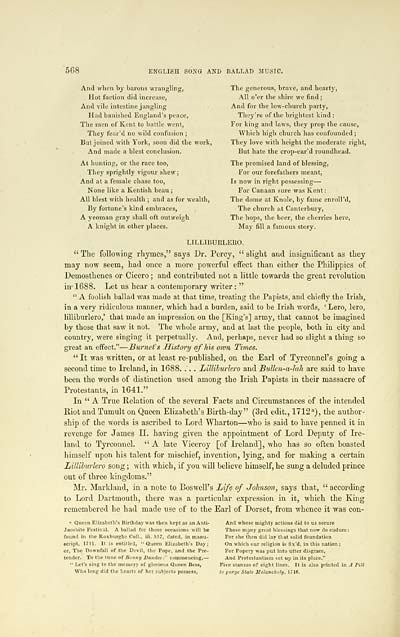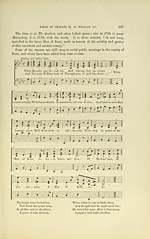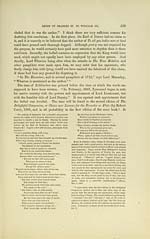Glen Collection of printed music > Printed text > Popular music of the olden time > Volume 2
(192) Page 568 - Lilliburlero
Download files
Complete book:
Individual page:
Thumbnail gallery: Grid view | List view

568
ENGLISH SONG AND BALLAD MUSIC.
And when by barons wrangling,
Hot faction did increase,
And vile intestine jangling
Had banished England's peace,
The men of Kent to battle went,
They fear'd no wild confusion ;
But joined with York, soon did the work,
And made a blest conclusion.
At hunting, or the race too,
They sprightly vigour shew;
And at a female chase too,
None like a Kentish beau ;
All blest with health ; and as for wealth,
By fortune's kind embraces,
A yeoman gray shall oft outweigh
A knight in other places.
The generous, brave, and hearty,
All o'er the shire we find ;
And for the low-church party,
They're of the brightest kind :
For king and laws, they prop the cause,
Which high church has confounded ;
They love with height the moderate right,
But hate the crop-ear'd roundhead.
The promised land of blessing,
For our forefathers meant,
Is now in right possessing —
For Canaan sure was Kent:
The dome at Knole, by fame enroll 'd,
The church at Canterbury,
The hops, the beer, the cherries here,
May fill a famous story.
LILLIBURLERO.
" The following rhymes," says Dr. Percy, " slight and insignificant as they
may now seem, had once a more powerful effect than either the Philippics of
Demosthenes or Cicero ; and contributed not a little towards the great revolution
iir 1688. Let us hear a contemporary writer : "
" A foolish ballad was made at that time, treating the Papists, and chiefly the Irish,
in a very ridiculous manner, which had a burden, said to be Irish words, ' Lero, lero,
lilliburlero,' that made an impression on the [King's] army, that cannot be imagined
by those that saw it not. The whole army, and at last the people, both in city and
country, were singing it perpetually. And, perhaps, never had so slight a thing so
great an effect." — Burnet's History of his own Times.
" It was written, or at least re-published, on the Earl of Tyrconnel's going a
second time to Ireland, in 1688. .'. . Lilliburlero and Bullen-a-lah are said to have
been the words of distinction used among the Irish Papists in their massacre of
Protestants, in 1641."
In " A True Relation of the several Facts and Circumstances of the intended
Riot and Tumult on Queen Elizabeth's Birth-day" (3rd edit., 1712 a ), the author-
ship of the words is ascribed to Lord Wharton — who is said to have penned it iu
revenge for James II. having given the appointment of Lord Deputy of L-e-
land to Tyrconncl. "A late Viceroy [of Ireland], who has so often boasted
himself upon his talent for mischief, invention, lying, and for making a certain
Lilliburlero song ; with which, if you will believe himself, he sung a deluded prince
out of three kingdoms."
Mr. Markland, in a note to Boswell's Life of Johnson, says that, " according
to Lord Dartmouth, there was a particular expression in it, which the King
remembered he had made use of to the Earl of Dorset, from whence it was con-
u Queen Elizabeth's Birthday was then kept as an Anti-
Jacobite Festival. A ballad for those occasions will be
found in the Roxburghe Coll., iii. 557, dated, in manu-
script, 1711. It Is entitled, "Queen Elizabeth's Day;
or, The Downfall of the Devil, the Pope, and the Pre-
tender. To the tune of Bonny Dundee:" commencing, —
" Let's sing to the memory of glorious Queen Bess,
Who long did the hearts of her subjects possess,
And whose mighty actions did to us secure
Those many great blessings that now do endure:
For she then did lay that solid foundation
On which our religion is fix'd, in this nation ;
For Popery was put into utter disgrace,
And Protestantism set up in its place."
Five stanzas of eight lines. It is also printed in A Pill
to purge State Melancholy, 1716.
ENGLISH SONG AND BALLAD MUSIC.
And when by barons wrangling,
Hot faction did increase,
And vile intestine jangling
Had banished England's peace,
The men of Kent to battle went,
They fear'd no wild confusion ;
But joined with York, soon did the work,
And made a blest conclusion.
At hunting, or the race too,
They sprightly vigour shew;
And at a female chase too,
None like a Kentish beau ;
All blest with health ; and as for wealth,
By fortune's kind embraces,
A yeoman gray shall oft outweigh
A knight in other places.
The generous, brave, and hearty,
All o'er the shire we find ;
And for the low-church party,
They're of the brightest kind :
For king and laws, they prop the cause,
Which high church has confounded ;
They love with height the moderate right,
But hate the crop-ear'd roundhead.
The promised land of blessing,
For our forefathers meant,
Is now in right possessing —
For Canaan sure was Kent:
The dome at Knole, by fame enroll 'd,
The church at Canterbury,
The hops, the beer, the cherries here,
May fill a famous story.
LILLIBURLERO.
" The following rhymes," says Dr. Percy, " slight and insignificant as they
may now seem, had once a more powerful effect than either the Philippics of
Demosthenes or Cicero ; and contributed not a little towards the great revolution
iir 1688. Let us hear a contemporary writer : "
" A foolish ballad was made at that time, treating the Papists, and chiefly the Irish,
in a very ridiculous manner, which had a burden, said to be Irish words, ' Lero, lero,
lilliburlero,' that made an impression on the [King's] army, that cannot be imagined
by those that saw it not. The whole army, and at last the people, both in city and
country, were singing it perpetually. And, perhaps, never had so slight a thing so
great an effect." — Burnet's History of his own Times.
" It was written, or at least re-published, on the Earl of Tyrconnel's going a
second time to Ireland, in 1688. .'. . Lilliburlero and Bullen-a-lah are said to have
been the words of distinction used among the Irish Papists in their massacre of
Protestants, in 1641."
In " A True Relation of the several Facts and Circumstances of the intended
Riot and Tumult on Queen Elizabeth's Birth-day" (3rd edit., 1712 a ), the author-
ship of the words is ascribed to Lord Wharton — who is said to have penned it iu
revenge for James II. having given the appointment of Lord Deputy of L-e-
land to Tyrconncl. "A late Viceroy [of Ireland], who has so often boasted
himself upon his talent for mischief, invention, lying, and for making a certain
Lilliburlero song ; with which, if you will believe himself, he sung a deluded prince
out of three kingdoms."
Mr. Markland, in a note to Boswell's Life of Johnson, says that, " according
to Lord Dartmouth, there was a particular expression in it, which the King
remembered he had made use of to the Earl of Dorset, from whence it was con-
u Queen Elizabeth's Birthday was then kept as an Anti-
Jacobite Festival. A ballad for those occasions will be
found in the Roxburghe Coll., iii. 557, dated, in manu-
script, 1711. It Is entitled, "Queen Elizabeth's Day;
or, The Downfall of the Devil, the Pope, and the Pre-
tender. To the tune of Bonny Dundee:" commencing, —
" Let's sing to the memory of glorious Queen Bess,
Who long did the hearts of her subjects possess,
And whose mighty actions did to us secure
Those many great blessings that now do endure:
For she then did lay that solid foundation
On which our religion is fix'd, in this nation ;
For Popery was put into utter disgrace,
And Protestantism set up in its place."
Five stanzas of eight lines. It is also printed in A Pill
to purge State Melancholy, 1716.
Set display mode to: Large image | Transcription
Images and transcriptions on this page, including medium image downloads, may be used under the Creative Commons Attribution 4.0 International Licence unless otherwise stated. ![]()
| Special collections of printed music > Glen Collection of printed music > Printed text > Popular music of the olden time > Volume 2 > (192) Page 568 - Lilliburlero |
|---|
| Permanent URL | https://digital.nls.uk/91364298 |
|---|
| Shelfmark | Glen.254a |
|---|---|
| Additional NLS resources: | |
| Attribution and copyright: |
|
| Description | Scottish songs and music of the 18th and early 19th centuries, including music for the Highland bagpipe. These are selected items from the collection of John Glen (1833 to 1904). Also includes a few manuscripts, some treatises, and other books on the subject. |
|---|
| Description | The Glen Collection and the Inglis Collection represent mainly 18th and 19th century Scottish music, including Scottish songs. The collections of Berlioz and Verdi collected by bibliographer Cecil Hopkinson contain contemporary and later editions of the works of the two composers Berlioz and Verdi. |
|---|

